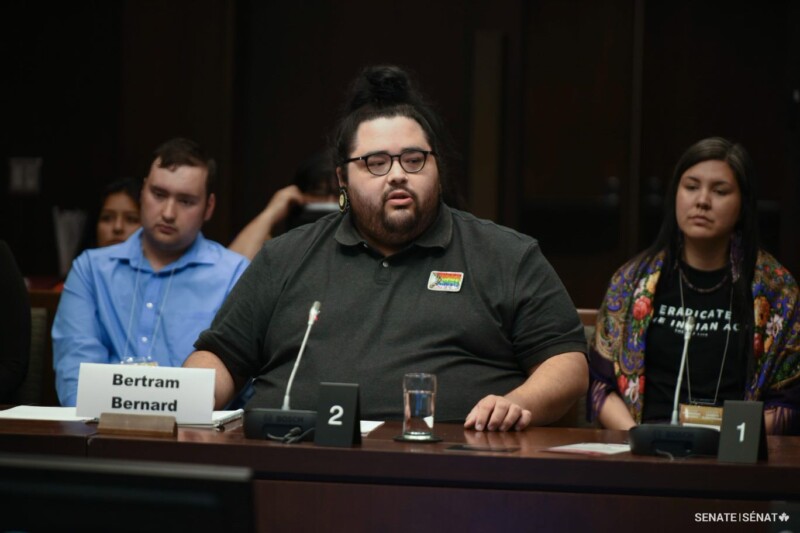How Culture and Community Shaped Muin Ji’j Bernard’s Career Path
 For Bertram Muin Ji’j Bernard, a 32-year-old Special Projects Coordinator with the Union of Nova Scotia Mi’kmaq (UNSM), staying rooted in Mi’kmaw culture and supporting his community has always been at the core of his journey. A proud graduate of both the Bachelor of Business Administration (BBA) and Master of Business Administration (MBA) programs at Cape Breton University, Muin’s time at CBU not only provided him with academic knowledge but also reinforced his dedication to advancing Indigenous governance and research within his community of Eskasoni.
For Bertram Muin Ji’j Bernard, a 32-year-old Special Projects Coordinator with the Union of Nova Scotia Mi’kmaq (UNSM), staying rooted in Mi’kmaw culture and supporting his community has always been at the core of his journey. A proud graduate of both the Bachelor of Business Administration (BBA) and Master of Business Administration (MBA) programs at Cape Breton University, Muin’s time at CBU not only provided him with academic knowledge but also reinforced his dedication to advancing Indigenous governance and research within his community of Eskasoni.
“CBU gave me the chance to stay close to my roots while pursuing my education,” Muin says. “I knew many fellow Mi’kmaw students, and being at CBU made me feel comfortable, connected and supported.” This sense of belonging was key for Muin, who, from the very beginning, was focused on finding ways to uplift Mi’kmaw people and traditions.
During his MBA program at CBU, Muin found his true calling—research that would help support Indigenous governance and development. “When I started my MBA, I was introduced to research, and it really clicked for me,” he explains. “It shaped my decision to work in this field.” Today, Muin works with UNSM on data projects that directly benefit Mi’kmaw communities across Nova Scotia.
Muin’s passion for culture and community is deeply tied to his career. “For me, it’s about more than just work,” he says. “It’s about serving my people and preserving our ways of knowing.” This connection between his cultural identity and professional path was fostered by Unama’ki College, CBU’s hub for services and supports designed for Indigenous students. “Unama’ki College is a fantastic place for Indigenous students. It’s a space where you can talk to Indigenous elders, students and professors who understand us,” says Muin. “It has always been a benefit to be able to go to a place where you can get that kind of assistance.”
However, Muin acknowledges that his transition to university wasn’t without its challenges. “Some early challenges were just the culture shock that most Indigenous students face. When you grow up within a First Nation community, you are more involved with our culture and traditions in everyday life, school, home, etc,” he explains. “It took a while to overcome that challenge, and I know some new Indigenous students are joining university now and facing a similar challenge.“
On top of that, he had to navigate the stereotypes and lack of understanding that many non-Indigenous students held. “The lack of understanding and knowing the Indigenous culture is a challenge because we tend to apply our Indigenous knowledge and culture not only in our school but also in our personal lives,” he says.
Throughout these moments, Muin found mentorship and guidance from key figures, particularly the late Joanne Pyke, who he remembers fondly for her unwavering support and mentorship. “She was a fantastic professor who understood our Mi’kmaw communities and culture and assisted with our Mi’kmaw tourism,” says Muin. “Being able to go to Joanne to talk about research, business, or life was a benefit.”
The balance of cultural pride and academic rigour was a driving force for Muin throughout his studies. He has taken this lesson into his work today, encouraging Indigenous students to bring their heritage into their academic pursuits. “Don’t be afraid to apply your Indigenous ways of knowing to your coursework. By doing this, you are advancing our culture and traditions and positively impacting your education. This is the first step in decolonizing your coursework, universities and workplace, ” he advises.
Muin’s education at CBU opened doors to many prestigious opportunities, including completing an Executive Education program at Harvard Business School and receiving Canada’s Indigenous Youth Leader Award from the Senate of Canada. But through it all, his focus has remained the same: supporting his people.
As CBU celebrates its 50th Anniversary and 50 years of Indigenous education, Muin reflects on the importance of recognizing Indigenous graduates and the impact they have on their communities. “Indigenous Alumni serve as role models, demonstrating resilience, strength and success in the face of historical and ongoing adversity,” he says. “Celebrating Indigenous alumni’s achievements recognizes their hard work navigating the colonial structures of academia and inspires current and future students to see the possibilities that education can offer. Celebrating their success is a powerful step in advancing reconciliation and promoting a more inclusive environment.”
Now, as he pursues an Executive Doctorate of Business Administration at Saint Mary’s University, Muin continues to apply the values of Mi’kmaw culture to everything he does. His story shows how nurturing cultural pride and community support can empower Indigenous students to achieve remarkable success in their education and beyond.